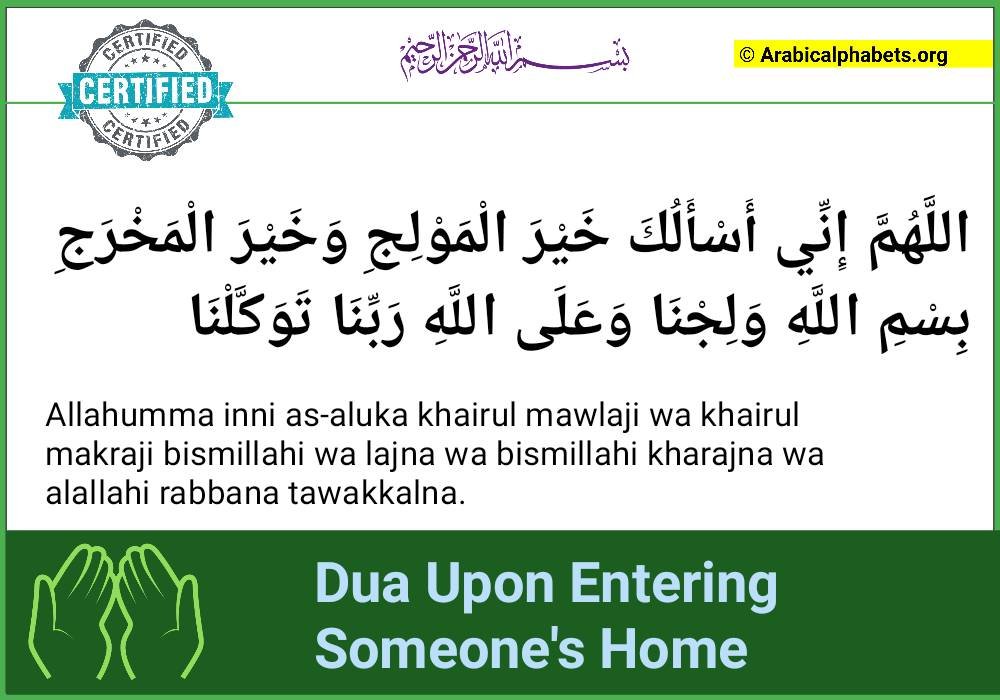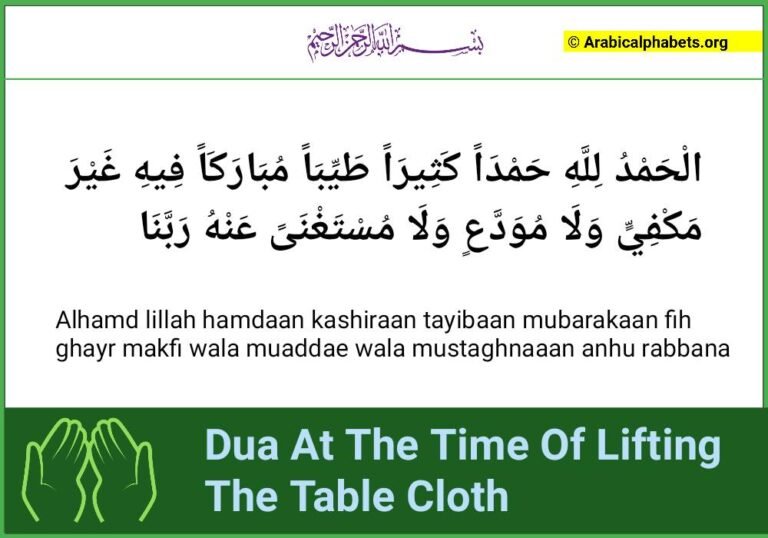Dua Upon Entering Someone’s Home Arabic & English
Searching for the perfect dua to recite when entering someone’s home can be overwhelming. With so many variations, knowing which one is the most authentic and effective can be difficult.
This article thoroughly introduces the various supplications (duas) recited in both Arabic and English when entering someone’s home.
Not only will we discuss what each dua means, but we will also explain how to use it effectively and appropriately.
|
Table of Contents
hide
Dua Upon Entering Someone’s Home
|
If you’re looking for the most accurate Islamic content and Dua Upon Entering Someone’s Home in Arabic and English, look no further than Arabicalphabets.org.
We provide a wealth of resources to help you learn more about the Arabic alphabet and its impact on the international community.
It is common for Muslims to say a specific prayer, or dua when they enter someone else’s home. This dua is a way of seeking blessings from Allah and asking for His protection.
The dua can be said in either Arabic or English, and it is recommended that Muslims learn it in both languages.
Upon entering someone’s home, the dua is as follows: “Bismillahi wa ‘ala barakatihi.
As-salamu ‘alaykum wa rahmatullah wa barakatu.” This translates to “In the name of Allah and with His blessing. Peace be upon you and the mercy of Allah and His blessings.”
Saying this dua is a way of showing respect to the homeowner and asking for Allah’s blessings.
When entering someone’s home, it is customary to say a dua. This dua is a way of asking Allah for His blessing and protection.
Many different duas can be said, but the most common is “Bismillahir-Rahmanir-Raheem.” This dua means “In the name of Allah, Most Gracious, Most Merciful.”
It is important to remember to say this dua when entering any home, not just Muslim homes. By saying this dua, we ask Allah to bless the people in the home and protect us from harm.
We should also try to ensure that our hearts are pure when we enter someone’s home to receive Allah’s blessing.
How to Properly Welcome Guests with Islamic Principles
Islam is a religion that has been practiced for centuries, and its teachings can be seen in the way many cultures around the world embrace hospitality.
Muslims adhere to Islamic principles when welcoming guests, which are an important part of their faith. When hosting visitors, greeting them with kindness and respect is essential.
Here are some tips on properly welcoming guests according to Islamic principles.
The first step in proper guest reception is a warm greeting when they arrive. This can include offering them a drink or snack upon arrival and ensuring they feel comfortable in your home.
Additionally, it is important to make sure that everyone who visits feels included and valued by having conversations with each guest individually rather than leaving them out of discussions during their visit.
Dua Upon Entering Someone’s Home: The Importance
When you enter someone’s home, it’s important to make Dua. Dua is an act of worship showing humility and submission to Allah.
It’s a way of asking for Allah’s blessing and protection. By making Dua, you acknowledge that everything comes from Allah and that you need His help.
Dua is especially important when you enter someone’s home because you are entering their space.
It would help if you showed respect for their home and their belongings. When you make Dua, you ask Allah to bless them and their home.
You also ask for His protection from any harm coming your way while you’re in their home.
Making Dua is a simple act but can have a profound impact. It shows your humility and submission to Allah. It demonstrates your respect for others.
American Muslims are a unique group of people who contribute to the diversity of American culture.
The American Muslim community has recently shared an outpouring of warm, welcoming gestures, from festivals celebrating Islamic holidays to providing meals for those in need.
These actions extend beyond their communities as they promote understanding and acceptance nationwide.
The Ramadan iftar tent has become iconic in many urban cities around America, where families and strangers come together to break bread during the holy month of Ramadan.
During this time, Muslim Americans provided food for hundreds of non-Muslim individuals who attended these events to learn more about Islam and its practices.
Not only do these gatherings provide an opportunity for people to explore different cultures, but they also present a chance for Muslims to share their values with others by showing hospitality and respect towards all guests regardless of religious background or beliefs.
Conclusion Points
My Advice: Dua, or Islamic supplication, is integral to Muslim prayer. Learning correct dua pronunciation from an Islamic scholar can help you to recite duas for maximum impact.
When a person enters someone else’s home, saying a dua or prayer is customary.
This dua is a way of asking Allah, or God, for permission to enter the home and to bless the occupants. It is also a way of showing respect for the homeowner and their belongings.
FAQs
What is the significance of reciting a dua upon entering someone’s home?
Upon entering someone’s home, reciting a dua is a way to seek blessings and protection from Allah for both yourself and the house’s occupants.
Can anyone recite this dua, or is it specific to Muslims?
The dua can be recited by anyone who believes in the power of prayers, regardless of their religious beliefs.
How do I learn the correct pronunciation and meaning of the dua?
Various online resources provide transliterations, translations, and audio recordings to help you correctly pronounce and understand the meaning of the dua.
Is there a specific time or situation when I should recite this dua?
It is recommended to recite this dua every time you enter someone’s home, whether a formal visit or a casual gathering.
Can I recite this dua silently, or must it be spoken out loud?
You can either recite the dua silently within your heart or speak it out loud – whichever makes you feel more connected to your prayer.
Are there any specific actions or etiquette associated with reciting this dua?
It is generally considered respectful to pause for a moment upon entering someone’s home, facing towards Qibla if possible, and then quietly recite the dua before proceeding further.
Can I say this dua in any language, or must it be in Arabic?
While saying the original Arabic version of the dua holds its spiritual significance, you can also say it in your native language if you are unfamiliar with Arabic.
Is there any particular benefit associated with consistently reciting this dua?
Consistently reciting this dua demonstrates gratitude and respect towards those whose homes we enter while seeking blessings from Allah. It helps foster positive connections and strengthens our relationship with Allah and fellow human beings.





